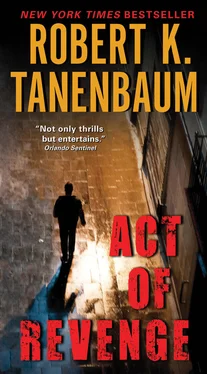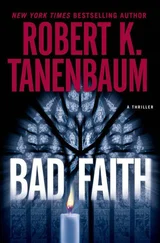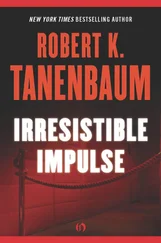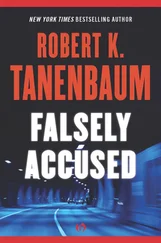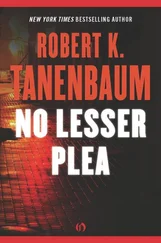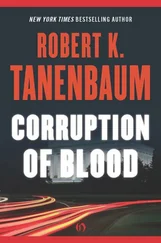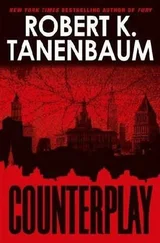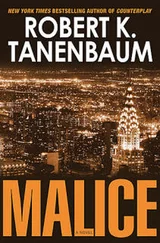Robert Tanenbaum - Act of Revenge
Здесь есть возможность читать онлайн «Robert Tanenbaum - Act of Revenge» весь текст электронной книги совершенно бесплатно (целиком полную версию без сокращений). В некоторых случаях можно слушать аудио, скачать через торрент в формате fb2 и присутствует краткое содержание. Год выпуска: 0101, Издательство: HarperCollins, Жанр: Криминальный детектив, на английском языке. Описание произведения, (предисловие) а так же отзывы посетителей доступны на портале библиотеки ЛибКат.
- Название:Act of Revenge
- Автор:
- Издательство:HarperCollins
- Жанр:
- Год:0101
- ISBN:нет данных
- Рейтинг книги:4 / 5. Голосов: 1
-
Избранное:Добавить в избранное
- Отзывы:
-
Ваша оценка:
- 80
- 1
- 2
- 3
- 4
- 5
Act of Revenge: краткое содержание, описание и аннотация
Предлагаем к чтению аннотацию, описание, краткое содержание или предисловие (зависит от того, что написал сам автор книги «Act of Revenge»). Если вы не нашли необходимую информацию о книге — напишите в комментариях, мы постараемся отыскать её.
Act of Revenge — читать онлайн бесплатно полную книгу (весь текст) целиком
Ниже представлен текст книги, разбитый по страницам. Система сохранения места последней прочитанной страницы, позволяет с удобством читать онлайн бесплатно книгу «Act of Revenge», без необходимости каждый раз заново искать на чём Вы остановились. Поставьте закладку, и сможете в любой момент перейти на страницу, на которой закончили чтение.
Интервал:
Закладка:
“Yeah, later,” said Lucy, “but first I have to do something. Let’s cross here.”
She dashed south across Canal, dodging slow-moving cars and trucks, Janice in her wake, and continued south on Mott.
“Where’re we going?” Janice asked.
“You’ll see.”
“I hate it when you get mysterious, Lucy.”
“That’s too bad, girl, because I’m mysterious a lot.”
Janice stopped in her tracks. “Tell me this isn’t about. . you know, because no way am I. .”
“No, this is personal. I have to open a bank account.”
They kept walking south into the heart of old Chinatown, herb shop and gambling cellar country, and other stuff, too, that the girls were not supposed to know about but did.
“Are we going to the Republic bank on the Bowery?” Janice asked.
“No, there’s one in there,” said Lucy, pointing down the narrow opening of Doyers Street. Originally an eighteenth-century cart track and not much improved since, narrow and twisted as a lane in Guangdong, Doyers is the shortest street in Chinatown. The sharp bend in its middle was known around the turn of the century as the Bloody Angle, because it was there that the hatchet men of warring tongs would wait to ambush one another, and for a while more people were killed here than on any other street in the nation. The tongs were respectable business associations now, of course, and didn’t employ hatchet men anymore. If you asked.
At Number 10 on this street, just across from where the original Chinese opera house used to be, stood a grimy building barely ten feet wide, fronted by a dusty glass window showing off three desiccated snake plants and bearing the legend in red characters “Kuen and Sons, Importing and Exporting.” No English translation was provided.
“This is a bank?” asked Janice.
“Kind of,” said Lucy. “Tran told me about it. The Kuens are pretty famous.”
“I never heard of them,” said Janice.
“Famous among mysterious people,” Lucy amended. She opened the door and they went in. A bell tinkled. They were in a small room lit by the streaked window and an overhead fluorescent fixture with two tubes dark and the remaining pair buzzing and flickering. A settee and two chairs in brown-painted rattan and a low lacquered table on which sat an old copy of China Today made up the room’s furniture. A calendar from a Chinese food company and the sort of cheap framed chinoiserie prints available in any shop in the district made up the wall decor. A ceiling fan hung motionless above them.
They heard soft footsteps. An elderly Chinese man stuck his head out of a door. Reading glasses were pushed up on his freckled, nearly bald pate, and he held a Chinese newspaper. He frowned when he saw Lucy and said to Janice in Cantonese, “What do you want? I am busy.”
In the same language Lucy said, “Venerable Kuen, forgive me for interrupting you, but I wish to deposit some money with your house.”
The man’s eyes opened wide at this, then narrowed. He calculated swiftly, a well-honed skill of his. Clearly this was the famous spirit-possessed daughter of the she-demon Shan-pei, and the other one must therefore be the eldest daughter of Chen. An interesting opportunity-it would not hurt to put the Shan-pei in his debt, and the Chens were also numerous, prosperous, and attentive of their obligations. He stepped back from the door and motioned them forward.
This room held a scratched table, three oak desks, with accompanying swivel chairs, one desk with a manual Underwood on it, the two others supplied with abacuses, two steel tube chairs with green oilcloth seats, several oak filing cabinets, a Barcalounger in green leatherette, a television on a metal stand, a typewriter table with a large many-keyed machine that Lucy recognized as a Chinese typewriter, and a tangerine tree in a big round blue ceramic pot. The walls were stained dark yellow-brown with decades of cigarette smoke. It smelled of boiled rice and old paper and tobacco and ink.
Mr. Kuen sat in one of the swivel chairs and favored the girls with a smile, about which the only genuine thing was the gold in three of the front teeth.
“An account, you said?” he inquired.
“Yes, Venerable Kuen. I have one hundred and ninety-two dollars.”
Mr. Kuen nodded and held out his hand. It was not a contemptible sum. Some of Mr. Kuen’s clients made that every week, others every two minutes. Mr. Kuen paid no interest on deposits, nor did he pay attention to the Internal Revenue Service or to the currency regulations of the United States of America. The house of Kuen had therefore many customers. He counted the bills and placed them in a desk drawer. Then he got out a cheap pad and a ballpoint pen. Passing them across the desk to Lucy, he said in Cantonese, “Write your name.”
Lucy wrote the character equivalent to the sound kap in Cantonese, which means grade or rank, and then the characters for old and poetry, or teacher, louhsi . Mr. Kuen took a ledger from the desk drawer, made a notation in a three-hundred-year-old code, wrote some characters on the pad, tore the slip off, and handed it over. Lucy tucked it away without impolitely studying it. She knew very well that it would be honored for $192 or its equivalent in goods in every Chinese community from Penang to Panama. After some ritual words expressing the honor that the house of Kuen realized from her patronage and Lucy’s declining of that honor, instead expressing the deep obligation she felt toward the house of Kuen (which was more nearly true), the girls left.
“Would you mind telling me what that was about?” Janice demanded.
“That guy at the med school is going to pay me big bucks, and I need a place to run my checks through without going through a regular bank.”
“Why don’t you just give them to your mom to cash?”
“Because I don’t want my mom to know.”
“What! Why not?” Janice was astounded. She could imagine having secrets from her mother, but not about money.
Lucy shrugged. “I don’t know,” she said. Which was true; that was the problem.
Janice dropped the subject, and they walked out of Doyers and back the way they had come. They were just past Pell on Mott, weaving through the increasingly crowded streets, when Lucy picked up the tail.
“I want something to drink,” said Lucy suddenly, and grabbed Janice’s arm.
“A soda? We can get one-”
“No, I want tea, and food, I want to sit down.” So saying, she hustled her friend down the short flight of stairs to one of the street’s many tea and bun shops. The place was sparsely occupied, a couple of old people at the counter and a few at tables. It was not a tourist place. Lucy pushed Janice into a chair facing the mirrored wall at the rearmost table, and Lucy used the pay phone briefly. Then she sat down with her back to the wall, watching. A sullen waiter came over; without being asked, he placed a steel quart pot of fresh boiling tea in front of them and departed.
“Lucy, what’s going on? Why are we in this joint?”
“We’re being followed by a couple of ma jai . Here they come. For God’s sake, don’t look around. Speak in Cantonese and play along with whatever I say.”
The two ma jai , little horses, gang members, swaggered in and sat at the next table. They called out loudly for tea and steamed pastry. Both of them wore sunglasses and black shirts worn outside dark trousers and opened to the chest, showing bridal white T-shirts. One had a broad, pockmarked face, a beefy guy in his early twenties. His companion looked younger, a teenager, thin-faced and jumpy. Lucy could feel their eyes on her through their dark glasses. She poured tea, took a scalding sip, and said, in a noticeable voice,“. . anyway, I’ll never do that again.” She gave Janice eye signals.
Читать дальшеИнтервал:
Закладка:
Похожие книги на «Act of Revenge»
Представляем Вашему вниманию похожие книги на «Act of Revenge» списком для выбора. Мы отобрали схожую по названию и смыслу литературу в надежде предоставить читателям больше вариантов отыскать новые, интересные, ещё непрочитанные произведения.
Обсуждение, отзывы о книге «Act of Revenge» и просто собственные мнения читателей. Оставьте ваши комментарии, напишите, что Вы думаете о произведении, его смысле или главных героях. Укажите что конкретно понравилось, а что нет, и почему Вы так считаете.
